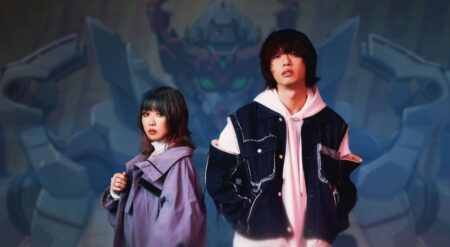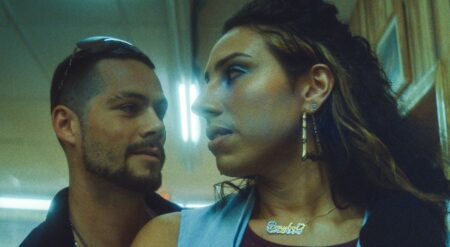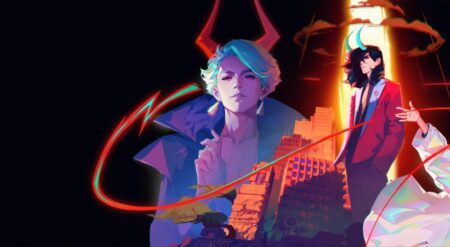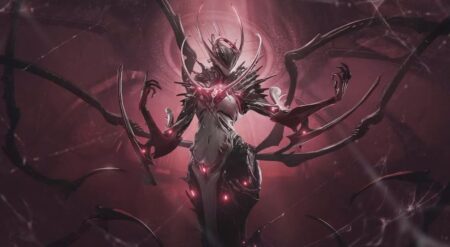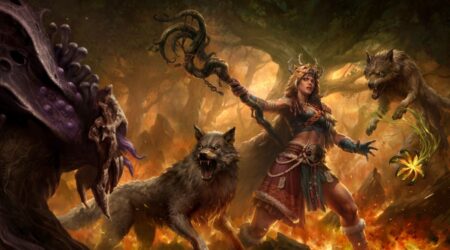I saw a tweet after Final Fantasy XIV: Dawntrail launched. It said that the user wasn’t apologizing for Zoraal Ja, the expansion’s antagonist, but as an older sibling, they were understanding. Like many of the expansions, Dawntrail’s narrative is the core. Whether you like or dislike the fetch quest structure of a progression, the narrative and the ensemble of characters assembled to sell it are where the depth and excitement in the game lies. While Wuk Lamat exemplifies the typical Shonen protagonist in some great ways, a heroine is nothing without her antagonists. Between Bakool Ja Ja, Sephene, and Zoraal Ja, Wuk Lamat has her work cut out for her.
We spoke with Spencer Ortega, the English voice actor behind bringing Zoraal Ja to life. One of many Latino cast members, a rarity in video games, we spoke about the importance of representation, authenticity, and, most importantly, not being contained in one box.
Like his co-stars, Otega knew that Final Fantasy XIV had a large fanbase, I mean, it is a part of one of the most beloved franchises in gaming and the most played MMO year over year. But having an idea of something and experiencing those fans are two completely different things. When asked about the fanbase, Ortega said, “I had like an idea. I knew that the fans in the fandom were super loving and super a lot of things. But I just didn’t know what to expect going into [Dawntrail]. There has been so much love, and I want to say, respectfully, thirst for certain characters that I never thought there’d be thirst for. I really appreciate how blunt and open everyone in the community has been. It’s very much my style.”
If there is anything that characters like Emet Selch or Zenos has shown among FF14 fans, it’s that bad guys are kind of always a big deal. And like his villainous predecessors, Zoraal Ja has layers and depth to his deeds. Ortega explained, “[Zoraal Ja is] definitely super complicated. In fact, it was kind of insane recording him specifically because, in the beginning, we just made him sound evil. We made him sound like a complete jerk. We did it, and it sounded cool, but from the get-go, [he sounded] so aggressive with nothing to grasp onto character-wise.
It turned into, ‘Oh, he’s an evil guy, so we saw that coming.’ After the first day, when we recorded so many [of the lines], we talked to Danny and Kate (the people who basically directed me the whole time), and we wanted to make him more likable in the beginning. That way, when everything kind of unfolded, it just hurt [the player] a lot more.”

While the impact is for the player’s sake, complexity is the hallmark of any good character. For Zoraal Ja, that was tapping into his motives and how he became who he is. Ortega added, “No one is truly evil, I don’t think that doing evil things, means that you’re evil, right? It was just really cool to see him kind of reshape and reform based on my vocal tones and in my pitch and how I say things, and makes it more likable to the point where, it hurts a lot when everything happens.”
Building complexity comes from the script, but it also depends on the actor bringing a character to life. We asked Ortega about balancing being a villain with he pain that Zoraal Ja carries, even if it’s just from his perspective—especially with the older sibling complex involved.
“Pain, that’s a very accurate word. I think that you were talking about the older sibling complex, which is a very real thing. I’m in the middle but I have a younger stepbrother and an actual, real older brother. And for the longest time, my brother was just the worst… But now we have so much genuine love for him, and we always did. It’s, but it’s so much easier to love him. Now, with that being said they’re all just kind of the opposite. At first, you think [Zoraal Ja] is so strong and filled with courage. Then you see everything unfolded and you have to stop and think, ‘I shouldn’t look up to this man.’ I mean, that’s his baby boy that he’s throwing right now. Maybe don’t pick up your child from the face.”
The fact that players can at least understand where Zoraal Ja is coming from at the beginning of the expansion is a testament to his writing as a villain. I mean, Final Fantasy 14 has had complex villains that always have their fans in the beginning (and sometimes the end). But you always do feel something for them. Zoraal Ja is the son of a two-head; he isn’t blessed, and he’s constantly being compared to either Bakool Ja Ja or his siblings. That comparison, whether thrust on him by others or a product of his own insecurity, manifests in his last moments. He just wanted his dad to love him like he loved the other children. As the audience, we know that Gulool Ja Ja, but the character, he can’t see past his own inferiority complex.
“Brains and hearts, when they collide, they’re very complex. Something seems like it’s good on the surface for [someone] but it doesn’t mean that it actually is. There have been many instances, even in this art form that I love so much, where there is heartbreak in this industry. It’s a struggle, you know, and we’re constantly fighting for our careers, for higher wages, and [against] AI. It’s a very tough world to be in. It seems so glamorous on the surface, but it’s the roller coaster every day. So I’ll say to connect to that when you look at Zoraal Ja. Zoraal Ja might seem like he has everything, but he has to prove himself every day of his life. He has so much pressure,” Ortega said.
Outside of being one of the defining villains of Dawntrail, Ortega is also part of a voice cast that is predominantly made up of Latino voice actors in every lead role. It’s a rarity in on-camera acting, especially when it comes to video game voice-over work. Dawntrail felt special with its take on Mesoamerica and the Southwest United States, but when you hit the credits and see the list of Latino voice actors? Well, it feels like a cultural milestone in gaming.
When asked about being a part of this cast in one of the largest MMOs out now in one of the most iconic franchises in gaming Ortega dug into what he saw growing up. “I think that growing up, there were no Latino superheroes that I could name. I was talking to Luis [Bermudez, the voice of Koana] about this yesterday and we were both like, ‘We can’t really name brown idols in the games that we played [or heroes in what we watched].’ I remember, like, Blue Beetle. And Jaime Reyes is still one of three or four Blue Beetles. So, it’s really cool to be in this space where, even though we weren’t physically recording with each other—Sena, Luis, Javier— all these people were representing Mesoamerica and this culture where sure they’re lizard people, but they got tacos.”
Ortega continued, “It is an honor to do it in such an amazing franchise and with my favorite character [that I’ve] played by far to date. It makes me proud, and it’s complicated. Being typecasted doesn’t always feel good, but representing [for Latinos] does, and finding that balance is difficult. It’s a never-ending fight back and forth in your head, ‘Am I doing this because I’m Latino, or am I doing this because I’m talented?’ I have to remind myself, it’s both! [Dawntrail] is a big win in my eyes and A good step. Because, as you probably know lately, some people have not been correctly cast [in other video games].”

By casting voice actors with different Latin backgrounds, the English dub voice cast also captured the differences in Spanish pronunciations and even accents that we see in every day life. Like any other language, there a many dialects of Spanish and you can see that just in how differently characters pronounce Tuliyollal.
“I loved hearing all of that,” Ortega said about the accent differences, “Because all that’s so true. We come from different nationalities and cultures. Like me, I’m half Mexican and half Salvadorian. I have my own flavor on things that I say, regardless of living in America, and I love hearing everyone’s take because it is really hard to communicate with each other. Sena said [a name] like this, or, you know, Louis said [a name] like that, and so I would ask [the director], ‘Do you want me to say it like that? Or do you want me to fit the mold?’ I love the beauty in us thinking about it differently and putting our own spin on it. It’s cool to see different cultures kind of clash and still be proud to be like a Latino actor. It makes me so happy.”
The topic of accents is a broad one in acting, especially for actors from outside English-speaking countries. But more generally, speaking with an accent in places where it isn’t appreciated can make you feel out of place. For Spencer Ortega, building Zoraal’s accent was to look at the accents he knew and make sure he always respected them.
“When you represent somebody, you bring that accent out. My first name is Spencer, and I talk like this,” he says with perfect American English diction, “Then I go into Ortega,” he transitions into pronouncing his name with the proper Spanish accent.
He continued, “People are like, wait, what? Because this is not what brown people are supposed to sound like. But being Chicano and being in America as a brown person, it’s a mixture, and I get to celebrate both sides of me. And I love that because as complicated as America is, I still love this place. I still love the people in it, and I have nerdy friends with me. We do D&D shows where we fight each other, and they’re called roguelike rumbles at a tavern, by Pick Your Poison Productions. But when we’re in that space, we’re just nerds like, and that’s what it is. We’re just nerds doing voices. And I’m so happy that I get to represent my side of being a nerd and being Latino because that mixture doesn’t really happen, you know? And I think people of color being in this nerdy space, it’s really hard to be represented because then we’re not just nerds. We’re like, brown nerds, you know, yeah, and it’s hard to avoid that.”

Ortega continued by pointing out the joy of representation, “We’re in a weird space. We’re not correctly represented and sometimes we’re not focused. And I think [Dawntrail] is just a really good focus. And I love being myself as much as I can being an evil lizard. Representing the people that have raised me and made me proud and at the same time.”
To close out the interview, we asked Spencer Ortega about his time as Zoraal Ja and how it feels to know that he’s a part of a long legacy. “I honestly didn’t understand the gravity of this character,” he said, “Shout out to my agent, he put my name in. He sent me out to where we recorded everything. And he’s like, ‘Hey, I think this is good for you.’I had no idea what it was. When I was in the booth, they said to play a villain with an accent, wink, wink. I genuinely thought when I started [the audition process] this was just going to be [for] a drug cartel. You know, a Latino with a scar. In the beginning, you know, the accent kind of formed itself. I was talking low, and I kind of had the accent in the beginning that you hear in World of Warcraft or Diablo. In the beginning, I talked like this, and then had like a British accent a little bit. Then it kind of formed; instead of that, I just put in the Latino flavor. I got really gruff with it, and that whole evil thing came into play.”
“I didn’t realize that this character that I thought was going to be a stereotypical villain was going to mean so much to people, yeah, and I have imposter syndrome when things come out, and I very much did with this,” he said, “What I love is so many people have reached out and told me that they love what I did with the character and what we did with the world. It makes me so proud to be a part of it, and it makes me remember why I did this in the first place, you know. It’s hard to even grasp the concept of you asking me these questions; this is my life’s love. People talk about finding the love of your life, and I find it within myself and in my craft. So I can’t tell you how much this means to me. I guess I’m going to marry everyone in the fantasy fandom.”
Final Fantasy XIV: Danwtrail is out now on PC, PlayStation 5, and Xbox Series X.


